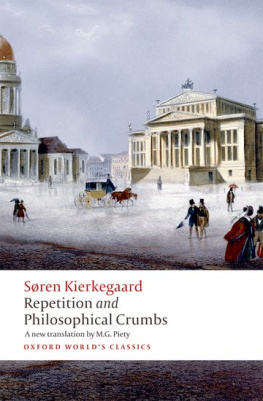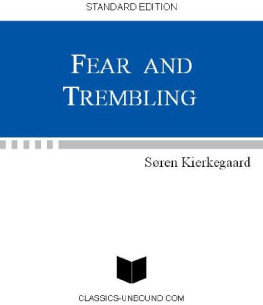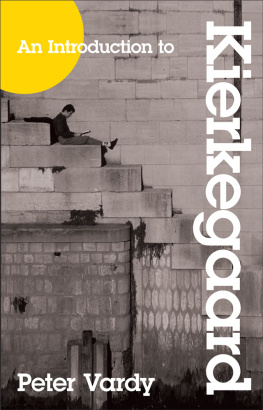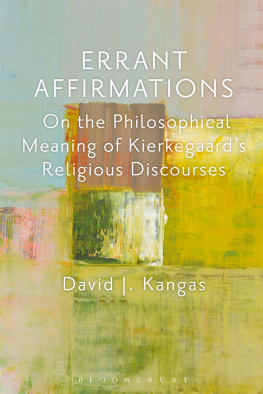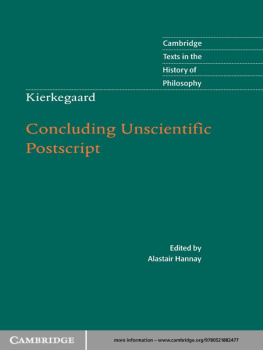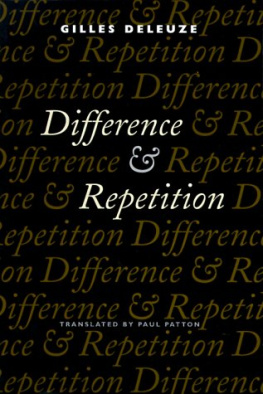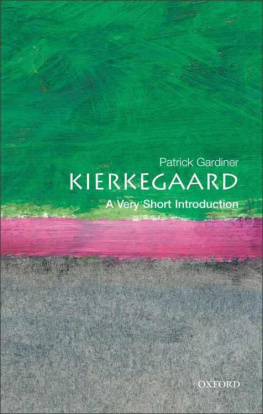OXFORD WORLDS CLASSICS
REPETITION AND PHILOSOPHICAL CRUMBS
S REN A ABYE K IERKEGAARD (1813-1855) was born in Copenhagen, Denmarks main trading port. He was a defining figure in Denmarks Golden Age, when its art and literature rivalled the best from Paris or Berlin. He earned the equivalent of a doctorate in 1841 with a dissertation on The Concept of Irony, with Constant Reference to Socrates. A substantial inheritance freed him to write full time and sidestep the compromises of an academic career. Though he went through an abortive engagement, he never married and was freed from the distractions of family life. He published Either/Or, Fear and Trembling, Repetition, and Philosophical Crumbs in 1843-4, and several other works in a variety of innovative genres thereafter. His writing career was to end with the massive Concluding Unscientific Postscript (1846), intended to be, indeed, his concluding statement, after which he would lead the simple life of a pastor. But by nature incurably polemical, a bitter dispute with a popular Copenhagen weekly kept him in the public eye. His critiques of the popular press, mass politics, and social club religion were to have a profound influence on twentieth-century existentialist, Marxist, and religious commentary on bourgeois society. As philosophers and social critics Heidegger, Arendt, Camus, and Sartre relied heavily on him, while his dazzling insights and literary skills were to influence the writers Ibsen, Rilke, and Kafka, Auden and Dinesen, as well as such theologians as Tillich, Barth, Buber, Bonhoeffer, and Levinas.
M. G. P IETY is an Associate Professor of Philosophy at Drexel University. She was a Visiting Scholar at the Department of Sren Kierkegaard Research at the University of Copenhagen from 1990 to 1998, and has published articles on Kierkegaard and on the philosophy of religion.
E DWARD F. M OONEY is Professor of Philosophy and Religion at Syracuse University. He is the author of On Sren Kierkegaard: Dialogue, Polemics, Lost Intimacy and Time (2007), as well as two other books on Kierkegaard and articles on Kierkegaard and moral philosophy.
OXFORD WORLDS CLASSICS
For over 100 years Oxford Worlds Classics have brought
readers closer to the worlds great literature. Now with over 700
titlesfrom the 4,000-year-old myths of Mesopotamia to the
twentieth centurys greatest novels the series makes available
lesser-known as well as celebrated writing.
The pocket-sized hardbacks of the early years contained
introductions by Virginia Woolf, T. S. Eliot, Graham Greene,
and other literary figures which enriched the experience of reading.
Today the series is recognized for its fine scholarship and
reliability in texts that span world literature, drama and poetry,
religion, philosophy, and politics. Each edition includes perceptive
commentary and essential background information to meet the
changing needs of readers.
OXFORD WORLDS CLASSICS
SREN KIERKEGAARD
Repetition and Philosophical Crumbs
Translated by
M. G. PIETY
With an Introduction by
EDWARD F. MOONEY
and Notes by
EDWARD F. MOONEY and M. G. PIETY


Great Clarendon Street, Oxford OX 2 6DP
Oxford University Press is a department of the University of Oxford.
It furthers the Universitys objective of excellence in research, scholarship,
and education by publishing worldwide in
Oxford New York
Auckland Cape Town Dar es Salaam Hong Kong Karachi
Kuala Lumpur Madrid Melbourne Mexico City Nairobi
New Delhi Shanghai Taipei Toronto
With offices in
Argentina Austria Brazil Chile Czech Republic France Greece
Guatemala Hungary Italy Japan Poland Portugal Singapore
South Korea Switzerland Thailand Turkey Ukraine Vietnam
Oxford is a registered trade mark of Oxford University Press
in the UK and in certain other countries
Published in the United States
by Oxford University Press Inc., New York
Translation and Notes M. G. Piety 2009
Introduction, Select Bibliography, and Notes Edward F. Mooney 2009
The moral rights of the authors have been asserted
Database right Oxford University Press (maker)
First published 2009
All rights reserved. No part of this publication may be reproduced,
stored in a retrieval system, or transmitted, in any form or by any means,
without the prior permission in writing of Oxford University Press,
or as expressly permitted by law, or under terms agreed with the appropriate
reprographics rights organization. Enquiries concerning reproduction
outside the scope of the above should be sent to the Rights Department,
Oxford University Press, at the address above
You must not circulate this book in any other binding or cover
and you must impose this same condition on any acquirer
British Library Cataloguing in Publication Data
Data available
Library of Congress Cataloging in Publication Data
Library of Congress Control Number: 2008943927
Typeset by Cepha Imaging Private Ltd., Bangalore, India
Printed in Great Britain
on acid-free paper by
Clays Ltd., St Ives plc
ISBN 978-0-19-921419-8
1 3 5 7 9 10 8 6 4 2
CONTENTS
INTRODUCTION
I N 1843, a few months before the publication of Repetition and about a year before that of Philosophical Crumbs, Kierkegaard published Either/Or in two volumes; the first (Either) evokes a fragment of life from the angle of an aesthetic existence, the second (Or), from an ethical standpoint. The compilation of papers evoking an aesthetic way of life includes poetic musings, music criticism, and reflections on tragedy. A mood of somewhat sinister dissipation and manipulation permeates the psychological intrigues of The Seducers Diary, a small novelette that has often been published separately. The second volume, also a compilation, includes letters addressed to the aesthete of Volume 1. They come from the pen of one Judge Wilhelm, a worthy citizen who gives a rather long-winded defence of an ethical way of life. There is a tension, then, between the Either and the Or that invites readers to weigh the aesthetic and ethical dimensions of their own orientations in life. Just to complicate matters, a short religious tract is inserted in the final pages. Beyond the life of a poet or a judge is the life of a pastor or priest. The pastors contribution to this fragment of life is a severe, accusatory sermon on our being always in the wrong as against God. Thus, in Volume 2 we have a critique not only of the self-indulgent aesthete but also of the self-satisfied Judge.
Either/Or, like Crumbs and Repetition, seeks to map the subtle ways that suffering is imposed and self-imposed, and to suggest paths of relief. We are aware that the book holds up a troubling mirror to our lives, and we see that as readers we have a role to play in negotiating the tensions between the ethical and the aesthetic, for instance. The books use of pseudonyms, and complex dramatic stagings, are characteristic. While Either/Or is but a small fraction of Kierkegaards total literary, philosophical output, Repetition and Crumbs represent an even smaller fraction, but their small size and lavish detail make them marvellous doors into Kierkegaards worlds.
Repetition marks the end of Kierkegaards initial, and in many ways richest, year of publication, 1843. Philosophical Crumbs comes a few months later. The Concluding Unscientific Postscript, a 500-page sequel appearing in 1846, is a tragi-comic treatise that stages Kierkegaardian subjectivity and objectivity, the roles of knowledge and passion in orienting a self, and the face-off between Reason and Faith. Front and centre is a self radically distinct from any social mass or group membership. Singular individuals struggle to make sense of things, to find a basis for life-shaping decisions, to find insight to ease the ubiquity of affliction, not least ones own. Repetition and Philosophical Crumbs open these themes, and display the artistry and wit of Kierkegaards infinitely restless moral and religious imagination.
Next page
